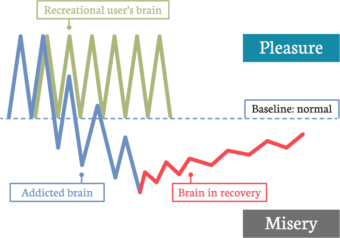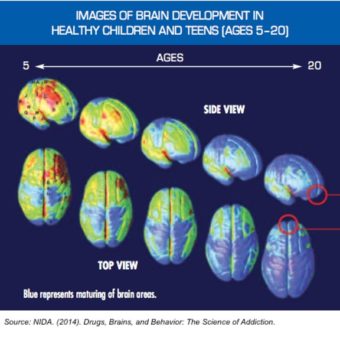Why can’t they just stop using?
Just like we turn down the volume on a radio that is too loud, the brain adjusts to drugs by turning down its ability to receive signals. As a result, the brain’s reward circuit of a person struggling with addiction is abnormally low. They feel flat, lifeless and depressed. They are unable to enjoy things they used to. They need to keep taking drugs so they feel normal — which only makes the problem worse. Because the brain is learning to tolerate the drugs, the person will take larger amounts to produce the same result.

Here is what an addicted brain looks like in an MRI

Stopping drug use doesn’t immediately return the brain to normal. Some drugs have toxic effects that can kill neurons-and most of these cells will not be replaced. While changes to connections between neurons in the brain may not be permanent, some last for months. Some research suggests the changes may even last for years.
Long-lasting brain changes can make it challenging for individuals struggling with addiction to stay drug-free. They often experience intense cravings for years, which can lead to relapse. However, the brain has neuroplasticity. That means it can repair itself, over time.
What is the impact of drugs on the adolescent brain?

The human brain does not fully mature until the mid-twenties. The limbic system governs feelings of reward and pain. It develops before the pre-frontal cortex which is the last part of the brain to fully develop. The pre-frontal cortex is responsible for executive functions such as insight, judgment, planning and impulse control.
The adolescent brain has been described as all gas and no brakes. An immature brain struggles with balancing self-control and impulse. It is why we have many laws to protect adolescents. For example, they cannot purchase alcohol or cigarettes or enter into binding contracts. Teenagers are risk takers. They pursue pleasure and seek to avoid pain while their ability to anticipate consequences and avoid risks has yet to fully develop.
The adolescent brain is particularly vulnerable to developing a substance use disorder. The brain is wired to engage in activities that release dopamine. Alcohol and drugs flood the brain with dopamine. Substance misuse alters the brain and compromises the user’s ability to say no. This is the case for adults, not just adolescents.
If an adolescent develops a substance use disorder, it can interfere with normal brain maturation. It is important to intervene to avoid potentially lifelong consequences. The good news is that the brain has the ability to heal itself (neuroplasticity) and can heal from problematic substance use.
For further information and discussion, see:
- Drug Facts — Understanding Drug Abuse and Addiction – NIDA
- The Science of Drug Abuse and Addiction: The Basics — NIDA
- Drugs, Brains and Behavior: The Science of Addiction – NIDA
- Addiction is a Brain Disease — Dr. Ruth Potee
- Voices of the Year — We Don’t Start With Needles in our Arms — Janelle Hanchett
- Opiods: how they trick the brain to make you feel good — The Vancouver Sun
- Neurobiologic Advances from the Brain Disease Model of Addiction — The New England Journal of Medicine
FAR would like to thank Dr. Meldon Kahan for reviewing the Addiction section of this website for accuracy.